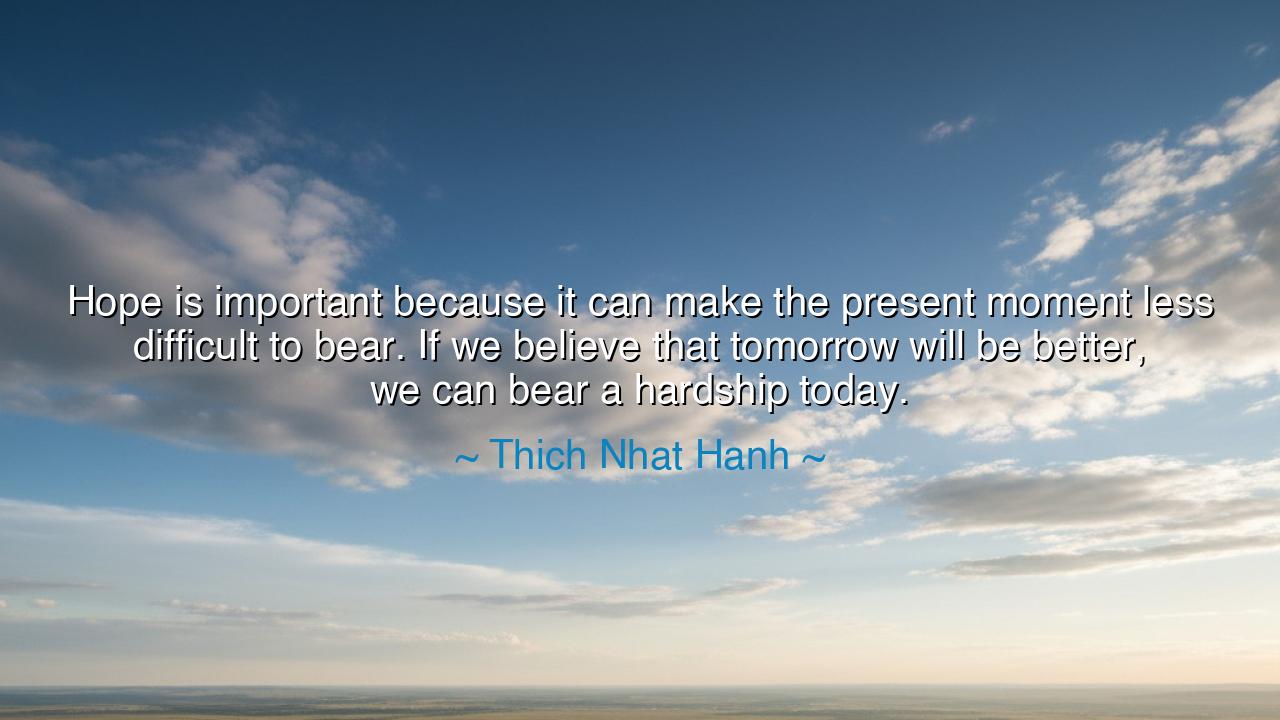
Hope is important because it can make the present moment less
Hope is important because it can make the present moment less difficult to bear. If we believe that tomorrow will be better, we can bear a hardship today.






The words of Thich Nhat Hanh—“Hope is important because it can make the present moment less difficult to bear. If we believe that tomorrow will be better, we can bear a hardship today”—shine like a lantern in the long night of human suffering. They come from the heart of a man who walked through war and exile, yet never lost his gentleness. A Zen master, poet, and peacemaker, Thich Nhat Hanh understood the currents of despair that flow through the world, and how the smallest flame of hope can steady the soul amid darkness. His words are both simple and profound, revealing that hope is not escape from reality, but a quiet power that helps us to endure and transform it.
To hope, as Thich Nhat Hanh describes it, is not to deny pain or flee from sorrow, but to give them meaning. Hope is the bridge between what is and what may yet be—the invisible thread that binds the broken heart to the promise of healing. When life presses upon us with grief, loss, or struggle, it is hope that whispers, “This is not the end.” It allows us to dwell in hardship without being consumed by it, to look upon suffering without surrendering to despair. In this sense, hope is not fantasy—it is courage in disguise, a quiet act of defiance against the forces that would break the human spirit.
Thich Nhat Hanh spoke these words not from comfort, but from the crucible of war. During the Vietnam War, he witnessed villages burned, families torn apart, and his homeland divided by hatred. Yet rather than turn away, he walked among the wounded, teaching compassion to both sides, helping to rebuild with his own hands. In the ruins of destruction, he discovered that hope was the only force strong enough to sustain the work of peace. “If we believe that tomorrow will be better,” he said, “we can bear a hardship today.” And indeed, the hope that peace was possible gave him strength to face suffering without anger, and to turn despair into mindful action.
History echoes this truth again and again. Consider Nelson Mandela, imprisoned for twenty-seven years in a narrow cell, cut off from his family and his freedom. He, too, bore great hardship by holding onto the belief that tomorrow would be better—that South Africa could one day be free from apartheid. Hope was his companion in solitude, his food when hunger struck, his light in the dark. Without it, his heart might have grown cold. But because he believed in a dawn that his eyes could not yet see, he endured his long night—and when the morning finally came, he rose not in bitterness, but in forgiveness.
The ancients would have called such endurance faith in the unseen—the power to trust in life even when its blessings are hidden. In the Taoist traditions, as in the teachings of Thich Nhat Hanh, hope is not a desperate grasp toward the future but a gentle breath of the present, a seed that grows quietly in the soil of patience. It teaches us that no winter lasts forever, that every hardship is a season in the great cycle of becoming. The wise therefore do not flee from suffering—they bear it with the strength of hope, knowing that what we endure today shapes the beauty of tomorrow.
But the master’s teaching carries a deeper warning as well: hope must not blind us to the present moment. To hope rightly is not to live in dreams of what will come, but to find the strength, here and now, to continue walking. Hope that is grounded in awareness gives peace; hope that is built on fantasy brings only disappointment. Thich Nhat Hanh taught his followers to breathe, to touch the present deeply, and through that mindfulness to discover true hope—the kind that is rooted in reality, yet always turns its face toward light.
Let this then be the lesson: when life weighs heavily upon your shoulders, do not cast off your burdens in despair, nor numb yourself with false comfort. Instead, hold to hope, but hold it wisely. Let it be a quiet flame within you, not a roaring fire that blinds your eyes. Believe that the pain you feel today is not meaningless, but part of a greater unfolding. Tend to your spirit as you would a garden—water it with patience, nourish it with gratitude, and trust that, in time, the blossoms of joy will return.
For in truth, as Thich Nhat Hanh teaches, hope is not escape—it is endurance made holy. It is the breath that keeps us walking through storms, the pulse that carries us from night into morning. To hope is to live, and to believe that life, even in its harshest moments, still holds the possibility of beauty. Therefore, in your darkest hours, whisper as he did: “Tomorrow will be better.” And let that belief, like the first light of dawn, make the present moment bearable, and sacred.






AAdministratorAdministrator
Welcome, honored guests. Please leave a comment, we will respond soon